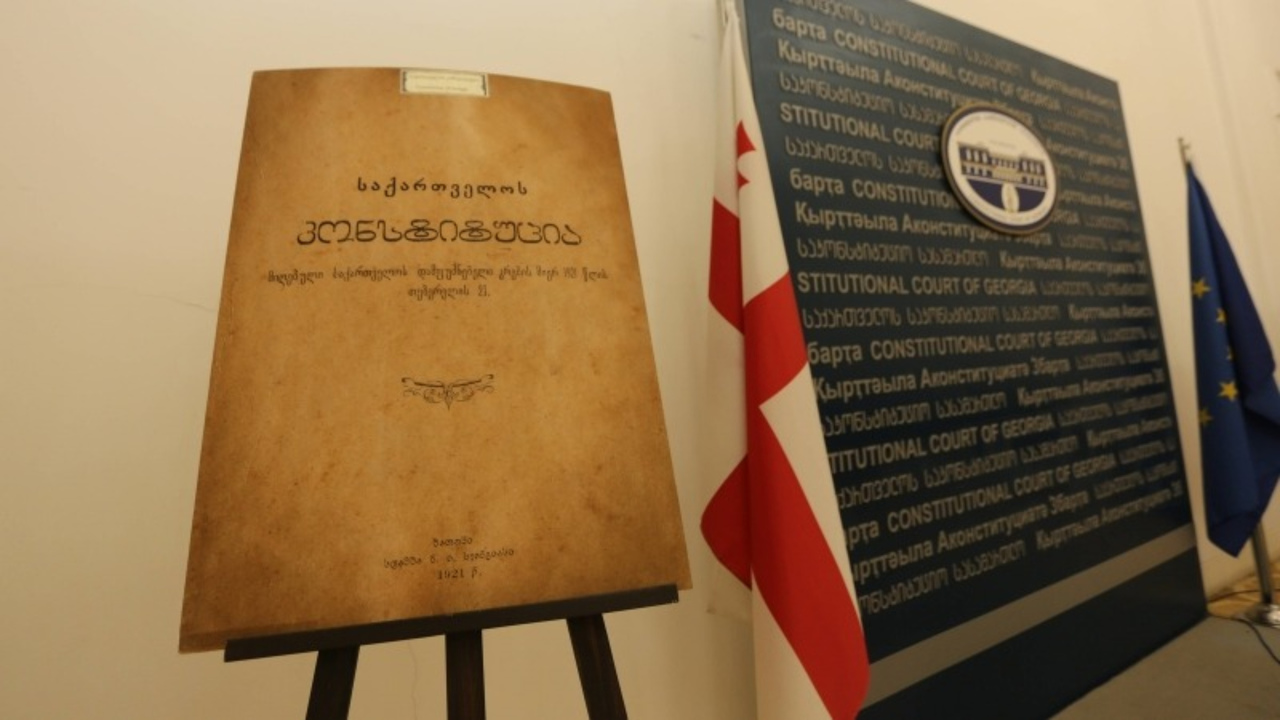Judges of common courts rarely apply to the Constitutional Court
Table of contents
- Constitutional submission procedure
- Who is the author of the constitutional submission?
- What is the advantage of constitutional submissions?
- How long will the court consider constitutional submissions?
- The flaw in the Criminal Procedure Code
- Importance of constitutional submissions
- Statistics of constitutional submissions
- The 2017 year
- The 2018 year
- The 2019 year
- The 2020 year
- The 2021 year
- The 2022 year
- Which legal acts are subject to constitutional submission?
- 2022 - 2 constitutional submissions
- 2021 - 5 constitutional submissions
- 2020 - 3 constitutional submissions
- 2019 - 2 constitutional submissions
- 2018 - 2 constitutional submissions
- 2017 - 3 constitutional submissions

Any judge of the common courts may apply to the Constitutional Court to assess the constitutionality of the normative act, which should be used during the hearing of a particular case and which, according to their reasonable assumption, may contradict the Constitution.
Through this mechanism, on the one hand, the Constitutional Court is allowed to discuss the constitutionality of a legal norm when a judge doubts its constitutionality, and on the other hand, the judge of the common Court themselves have the leverage not to base a decision on a norm, the constitutionality of which is they are not confident in.
In 2017-2022, a total of 17 submissions were presented to the Constitutional Court of Georgia from the common courts.
Tetritskaro District Court (Judge) prepared the largest number of 4 constitutional submissions
Georgian Supreme Court - 12%
Tbilisi Court of Appeals - 17%
Bolnisi District Court - 18%
Tetriwyaro District Court - 23%
Kutaisi Court of Appeals - 6%
Telavi District Court - 6%
Overall, the institution of constitutional submission of common courts protect the parties in civil and administrative proceedings, and the case of criminal cases – the accused and other participants in the proceedings from using unconstitutional norms against them.
Constitutional submission procedure
The organic law on the Constitutional Court of Georgia defines the procedural details of the constitutional proceedings based on the constitutional submission: the submission must be written and substantiated. The justification implies both the presentation of legal grounds and the indication of the specific case in which it became necessary to use it. However, it is necessary to reinforce the submission with evidence that proves its validity. The Organic Law of Georgia" on the Constitutional Court of Georgia " was amended in 2022 on November 24, according to which the constitutional submission may indicate precedents of the European Court of human rights on such legal issues.
To be accepted by the Constitutional Court for consideration, a constitutional submission in form or content must comply with the requirements of the Organic Law.
In case of constitutional submission, consideration of the case shall be suspended until the Constitutional Court makes a decision.
Who is the author of the constitutional submission?
- A judge of the general court should apply to the Constitutional Court with a constitutional recommendation at the stage of hearing the case;
- The author of the constitutional submission must be the judge directly reviewing this particular case;
- Since the General Court may consider the case alone, as well as with a collegial composition of judges, the author of the constitutional submission may therefore be both a judge and a panel of judges.
What is the advantage of constitutional submissions?
Based on the submission of the general court, before the final decision by the Constitutional Court, the hearing of this case, in which the disputed normative act is applied, should be suspended.
Such a rule does not apply to the proceedings initiated based on a constitutional claim, and even if a decision is made in favor of the plaintiff, i.e. if the norm is recognized as unconstitutional, it will only have a Post-Factum impact on the plaintiff's legal situation.
Another difference from the constitutional claim is that in the case of a constitutional submission, the author (judge) of the submission cannot refuse to consider the submission by the Constitutional Court and, accordingly, the consideration of the constitutional submission continues in any case.
How long will the court consider constitutional submissions?
The term of consideration of a constitutional submission shall not exceed 9 months from the moment of registration of a constitutional claim or constitutional submission in the Constitutional Court. In special cases, the chairperson of the Constitutional Court extends the term of consideration of the claim for no more than 2 months.
The flaw in the Criminal Procedure Code
The Criminal Procedure Code of Georgia indicates that in the case when a criminal case is considered in a court and the judge (judges) consider that the material or procedural norms of criminal law applicable to this particular case may be unconstitutional, they shall apply to the Constitutional Court with the authority granted to them by the organic law on the Constitutional Court.
According to the Organic Law of Georgia" on the Constitutional Court", the hearing of the case is suspended in a mandatory manner until the final decision is made by the Constitutional Court.
In the Criminal Procedure Code, one of the grounds for suspending a court hearing is an appeal to the Constitutional Court of a judge reviewing a case on the constitutionality of the law.
In addition, it is also indicated that in such a case, based on the motion of the court, the court decides on the suspension of the trial.
It is unclear why the procedural code indicates the need for a party's motion when in the case of an appeal to the Constitutional Court by a judge, the hearing of the case automatically stops. Regardless of whether there is a problem in practice or not, the existence of a legislative record that regulates the issue imperatively established by organic law is not justified.
Constitutional submission to the case of persons in whom imprisonment has been applied as a preventive measure.
It is interesting, what happens when imprisonment is used as a preventive measure against the accused in a particular case and the case is suspended due to constitutional submission?
The Criminal Procedure Code stipulates that the court is obliged, on its initiative, to consider the issue of the necessity of leaving imprisonment in force at least once every two months.
In this case, it would be important if the Criminal Procedure legislation specified the procedure for the revision of the preventive measure, in the case when the hearing of the case is suspended due to constitutional submissions.
Importance of constitutional submissions
A judge is a person who is in the best position in exercising judicial authority, as they can identify problematic aspects related to the constitutionality of the norm and apply them to the Constitutional Court to decide on them. Considering that the judge is an impartial arbitrator and does not represent an interested party, there is an expectation that the submission is not aimed at achieving the desired legal result, but at making a legal decision and properly implementing justice.
Statistics of constitutional submissions
The use of the constitutional submission mechanism can be considered one of the indicators of the proper administration of Justice. By constitutional submission, the Constitutional Court can appeal to the Constitutional Court of all three instances.
The Georgian Court Watch studied the official statistical data and annual reports of the Constitutional Court of Georgia. We present statistical information on the use of the possibility of constitutional submission by common courts during the last 5 years:
The 2017 year
In total, 423 constitutional lawsuits and submissions were registered:
- Constitutional claim - 420
- Constitutional submission - 3
The 2018 year
In total, 95 constitutional lawsuits and submissions were registered:
- Constitutional claim-93
- Constitutional submission-2
The 2019 year
In total, 92 constitutional lawsuits and submissions were registered:
- Constitutional claim-90
- Constitutional submission-2
The 2020 year
In total, 81 constitutional lawsuits and submissions were registered:
- Constitutional claim-78
- Constitutional submission-3
The 2021 year
- Constitutional submission-5
The 2022 year
- Constitutional submission-2
(Since the statistics and annual reports for 2021-2022 are not published on the website of the Constitutional Court, the Court Watch only indicates the statistics of constitutional submissions studied by them).
Over the past 5 years, the number of constitutional appeals far exceeds the number of constitutional submissions of judges of common courts. Most likely, the reason for this is the excessive workload of judges and, in general, the judicial system.
This is evidenced by the position of the judges themselves. The Court Watch observes the ongoing interviews with judicial candidates in the High Council of justice, during which one of the candidates (who is an acting judge) noted that due to a large number of cases, judges do not have time to use such mechanisms as constitutional submissions.
As already mentioned, the constitutional submission shall be accepted for consideration when it is properly substantiated and supported by evidence. Accordingly, its preparation is associated with the appropriate time and resources.
Which legal acts are subject to constitutional submission?
It is interesting to know which instance courts most often use the mechanism of constitutional submission and in relation to what category of legal acts.
According to the information available on the website of the Constitutional Court, at this stage, the following is given:
2022 - 2 constitutional submissions
- Tbilisi Court of Appeals-Local Self-Government Code;
- Bolnisi District Court-Criminal Code.
2021 - 5 constitutional submissions
- Tetritskaro District Court-Criminal Procedure Code;
- Tetritskaro District Court-Criminal Procedure Code of Georgia;
- Bolnisi District Court-Criminal Code;
- Kutaisi Court of Appeals-Civil Procedure Code;
- Tbilisi Court of Appeals – Administrative Procedure Code.
2020 - 3 constitutional submissions
- Telavi District Court - Criminal Procedure Code; Criminal Code;
- Tbilisi City Court - Administrative Procedure Code; tax code of Georgia.
- Tetritskaro District Court-Criminal Procedure Code.
2019 - 2 constitutional submissions
- Tbilisi Court of Appeals-Criminal Code;
- Tbilisi City Court-Criminal Code.
2018 - 2 constitutional submissions
- Tbilisi City Court-Civil Procedure Code;
- Tetritskaro District Court-Criminal Procedure Code.
2017 - 3 constitutional submissions
- Bolnisi District Court-Criminal Code;
- Supreme Court of Georgia-Criminal Code;
- Supreme Court of Georgia-Criminal Code.
As can be seen from the above data, during the last 5 years the majority of constitutional submissions are related to the Criminal Code of Georgia and the Criminal Procedure Code of Georgia, and the author of the submissions is the judge of the court of First Instance.
---
The materials distributed by courtwatch.ge and published on the website are the property of "Georgian Court Watch", when using them, "Georgian Court Watch" should be indicated as the source.

Constitutional claim of common courts judges

Pre-trial Preventive Measures

Appointments of current judges: in the same or higher instance court

How are chairmen appointed to common courts?































